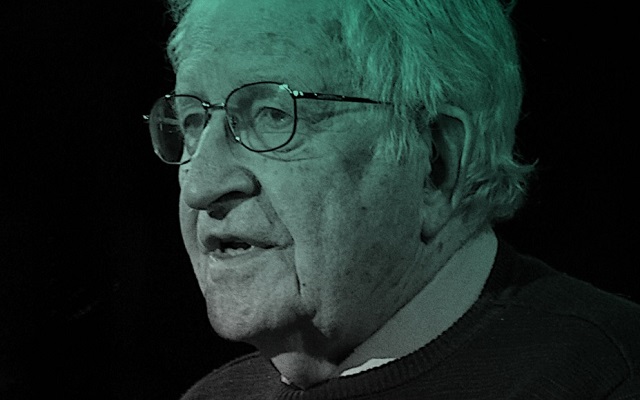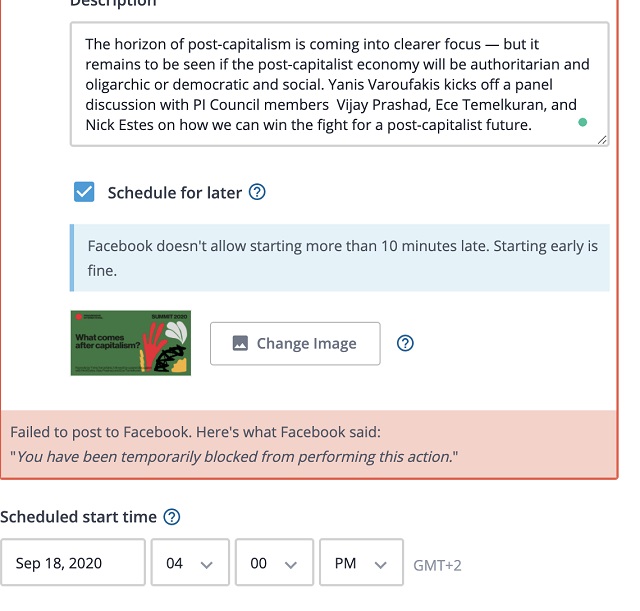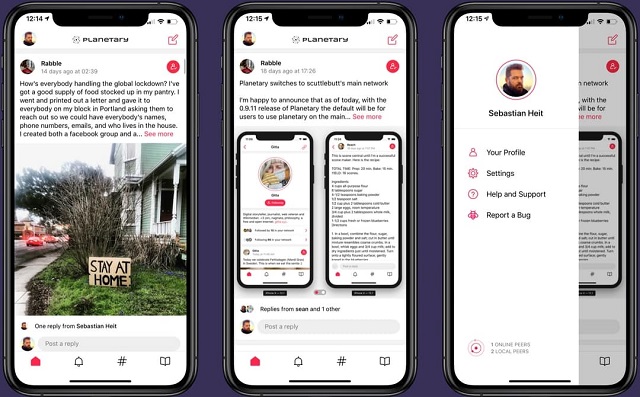Big Tech vs The Left: How Facebook (almost) blocked Chomsky Analysis
New in Ceasefire - Posted on Wednesday, September 30, 2020 16:52 - 0 Comments
By Harry Halpin

Noam Chomsky (Credit: Progressive International)
Although most of the complaints of censorship on Facebook come from the right, content moderation is also being weaponized against the Left. We had a powerful example of this earlier this month, on 18 September 2020, when Facebook momentarily blocked the livestreaming of the inaugural summit of the Progressive International, a newly formed global alliance of organizations on the Left. How is it that an online discussion featuring luminaries of the Left, ranging from Noam Chomsky to Cornel West, can be so easily and inexplicably ‘cancelled’ by Big Tech?
As the time approached for the livestreaming of Chomsky’s address on “Internationalism or Extinction” across the world, the organisers could only see the following error message: “You have been temporarily blocked from performing this action.” Despite having successfully used Facebook’s livestream before, there was this time neither a reason given nor a path to an appeal. From Facebook’s arbitrary and opaque decision there seemed to be no escape.
Facebook did not give a reason for this apparent act of censorship. The Progressive International had been planning for months on broadcasting in Spanish, Portuguese, and French to hundreds of thousands in South America and Africa, where many people are trapped inside of Facebook’s wildly controversial and neo-colonial ‘Free Basics’ programme. While a free offering, the programme limits the internet allowed to people in the Global South to the use of Facebook and approved partners. And so, although alternative streaming platforms were set up, only streaming over Facebook could realistically reach many of the most oppressed people in the Global South. As the Progressive International’s spokesperson stated:
“We are deeply disappointed that Facebook is blocking people coming together across borders to confront humanity’s shared problems at the Progressive International’s launch Summit. We wanted to livestream today’s public events, which include keynote speeches from Noam Chomsky, Naomi Klein, Yanis Varoufakis and a panel discussion about anti-democratic lawfare in Latin America. We don’t know why Facebook is preventing people watching on its platform but we strongly urge them to reverse its decision, allow our event to take place unhindered and commit to operate its content moderation in a transparent manner.”
The Progressive International reached out to me and others as a back-channel to Facebook. I used my contacts to ask Facebook’s engineers to remove the ban on the livestream, as well as getting media and other public figures involved. Others reached out to Facebook’s policy teams. Mysteriously, Facebook soon relented. A few minutes before Chomsky’s speech was to begin, the livestream was turned back on.
What happened?
Under increasing pressure from Democrats to stop “fake news” and “hate speech,” Facebook and Twitter have recently introduced “content moderation” mechanisms, which include both labelling and censoring speech that violates their impossible to read “terms of service” and constantly updated “community standards.” Currently, the dirty job of censorship is performed by an army of human content moderators, usually based in the global South. Facebook alone employs thousands of contractors who respond daily to thousands of complaints from users as well as governments. Having to see a nearly infinite stream of some of the worse the internet has to offer, with only seconds to make a decision to censor or not, these “content moderators” are overworked and traumatised, yet are typically paid sub-standard wages without benefits or healthcare. Perhaps it should thus come as no surprise that their checks are not models of rigour, leading to a speech by Noam Chomsky for the Progressive International being censored as “extremist content” based simply on a user flagging it as such.
However, it would be wrong to dismiss this episode as isolated incident. To the contrary, it highlights a serious and alarming reality: The Internet has no public space, despite widespread impressions to the contrary. Facebook, Google, Apple, and the rest are privatised American ‘Big Tech’ platforms where there is no legally enshrined right to free speech. Despite being arguably the world’s primary method of public communication today, platforms like Facebook are a law unto themselves in terms of censorship. As put by American lawyer Ron Kuby, Facebook remains a private company in terms of the Constitution, so the First Amendment simply does not apply to livestreaming or posting content on Facebook.
Even the recourse to human judgement is disappearing, with humans being taken out of the content moderation loop. In its search for profit maximisation, Big Tech is increasingly automating tasks, even that of identifying “fake news”, via machine-learning algorithms. Sometimes labelled under ‘Artificial Intelligence’, these automated algorithms simply classify content automatically, normally based on statistical similarities to previously censored content. These systems vary immensely in complexity. For example, the keywords ‘COVID-19’ and ‘5G’ can lead to automatic censorship on Twitter. In light of the current wave of conspirationism and disinformation around public health issues, this can seem sensible, but where to draw the line? Today, tweets with the words “oxygen” and “frequency” are also liable to be automatically blocked.
These algorithms of censorship generally tend to be more subtle, such as a machine-learning algorithm trained to recognise ‘revenge porn’ content on Tumblr by automatically detecting and then censoring pictures and obscene text. Often these algorithms can run amok, however, removing everything from art to personal photos. It does not take a huge leap of imagination to grasp what will happen when these algorithms are trained to target ‘antifa’ content for automated censorship.
There are also more quiet forms of censorship, such as the infamous “shadowbanning,” whereby a person’s presence and activity on a social media platform is rendered invisible without them being aware that this is taking place. Usually this takes place on Facebook or Twitter by having certain tweets or posts simply not be shared with others, or making them difficult to discover, even if the actual material is still available and so not technically removed or blocked. The problem is insidious and widespread: Truthdig, Alternet, the World Socialist Web Site, and even the Intercept have all had their content “shadowbanned” by Google since 2017 – leading to a dramatic drop in readership figures – by seemingly pushing these websites further down users’ search results.

(Source: Pawel Wargan/Progressive International.)
The war on dissent
While we have all become normalised to the censorship of figures on the right, such as Alex Jones, it should be remembered that censorship has historically been aimed far more at the Left. Taking the United States as an example, the Espionage Act of 1917 criminalized any speech against the interests of the US military, and was used to send former Socialist presidential candidate Eugene Debs to jail just for giving speeches encouraging people to resist the draft. A century later, the self-same Act is being used to censor Wikileaks for exposing war crimes in Iraq, just as it was used (although unsuccessfully) against whistle-blower Daniel Ellsberg for revealing the extent of U.S. war-crimes in the Vietnam War. What the Ellsberg and Assange cases show is that free speech that conflicts with the foreign policy goals of the US empire runs the risk of being banned and suppressed, with possible criminal charges and extradition from anywhere in the world. Today, both long-standing explicitly repressive laws like the Espionage Act and the new “content moderation” trend by social media behemoths are leading to the same result: Censorship of dissent.
In 2020, all over the world governments from Brazil to France are working to regulate speech on social media. Although Big Tech routinely ignores calls for regulation from countries outside the United States, now Trump and the Republicans are copying the Democrats by exerting pressure to ban “extreme” content as well. But who defines what is “radical” or “extreme”? Currently, the definitions are vague and can be interpreted not only as getting rid of images of ISIS beheading hostages, but also of progressive content on topics like inequality and climate change that may “radicalise” youth into become critical of the current system. Should we be surprised at the recent rumours that “antifa” and “Black Lives Matter” Twitter accounts will be taken down in the run-up to the US election this November?
Many decried Edward Snowden by suggesting the NSA’s mass surveillance programme seemed harmless under Obama. But the technology of censorship itself is neutral to who controls it. In the hands of fascists like Trump, this architecture of censorship and surveillance – built by Facebook and others – could be used to censor, track, hunt, and even kill the ‘antifa’ opposition. In this regard, the Democratic Party, with its huge influence in Silicon Valley, is ironically the primary supporter of censorship of social media in the United States. If Biden wins the election, there remains a good chance social media censorship will be weaponised against ‘anarchists’ and ‘radicals’, even including supporters of Bernie Sanders.
The alternative
Alternatives exist to both state and corporate censorship. In reaction to Facebook blocking the Progressive International, Evan Henshaw-Plath, the man who hired Jack Dorsey to run Twitter at its inception, noted “it’s not about simply getting better people in charge of the companies, because the constraints are economic and political in pushing anyone who runs the platform to similar decisions.” Although traditionally we only conceive of two models for regulation – the state or the market – many engineers are looking into how to run social media platforms more like a commons, where communities can create decentralised, self-governing social media spaces where those that violate community norms can be banned from a community but not from the entire system or lose their data.
Blockchains may provide key technological underpinning to make all content permanent and censorship-resistant, such as Henshaw-Plath’s Planetary, a blockchain-based alternative to Twitter. Even Jack Dorsey, Twitter’s CEO, is considering using blockchains in order to decentralise Twitter itself. Blockchain technology is developing, but even without it you can still fairly easily host your own federated social media platform using off-the-shelf software like Mastodon. Nonetheless, the reason we cannot all migrate to these emerging decentralised and democratic social media alternatives is that the vast amount of sentient life on the planet is already using Facebook, creating a vast ‘network effect’ that is, in effect, simply a monopoly on communication.

The Planetary App
The groups that have left Facebook and Twitter due to censorship have so far included Neo-nazis and other assorted racists, many of whom have gone on to alternative social networking software Mastodon. Ironically enough, Mastodon was created to allow community self-governance, and to prevent Nazis from taking over community information. Mastodon’s developers have decried Nazis using their software but could do nothing about it. The price of a decentralised alternative to Twitter is that any community, from progressives to Nazis, can create their own community online. Still, I would argue that allowing anyone to use the technology to create their own online community this is a price we must pay unless we want to destroy progressive social movements
Before being exiled from the United States under the Espionage Act that now targets Julian Assange, feminist anarchist Emma Goldman said to the judge, “Shall free speech and free assemblage, shall criticism and opinion – which even the Espionage Bill did not include – be destroyed?” She was right. The Left must always support free speech and free assemblage rather than ‘de-platforming’ and ‘cancelling’ speech. Ideologically, arguments against ‘free speech’ tend to favour the absolute and unchecked power of a few corporate giants over billions of users. As a practical matter, even if certain confused American progressives, like Ocasio-Cortez, support Facebook “taking down lies”, imagining this will only be used against the Right, this very same technical architecture of censorship and surveillance will certainly target progressive social movements.
Let us not forget that the success of progressive social movements comes ultimately from their ability to reach people and open up spaces for self-organisation, using the best information technology available at the time. Just as the smuggling of revolutionary pamphlets from Switzerland into France laid the ground for the French Revolution in the 18th century, the publishing of underground newspapers like Pravda was vital to the Russian Revolution in the 20th. At the dawn of the 21st century, the trend continued with social media itself being ‘invented’ by initiatives like Indymedia in support of the Zapatista revolution and the anti-globalization movement.
Simply put, the free flow of information is a precondition for revolutionary social change. To reach people with our ideas, we should both support the creation of censorship-resistant and democratic alternatives to Twitter and Facebook, while simultaneously fighting censorship on those platforms. To censor speech is, in the end, cowardly and self-defeating. What is needed is the courage to combine waging arguments online with fighting neo-liberalism in the streets.



Leave a Reply